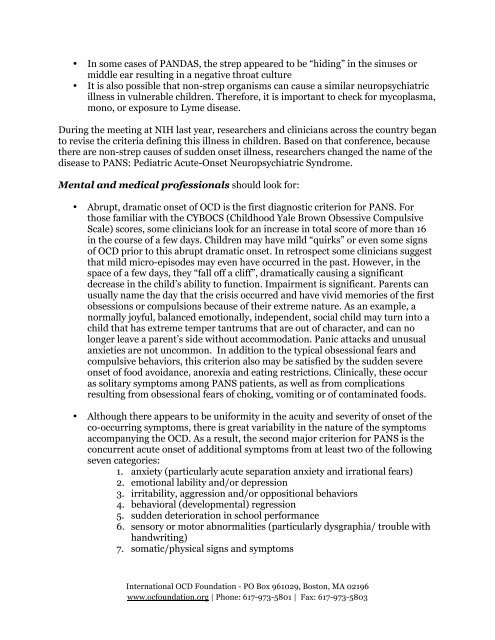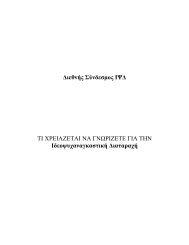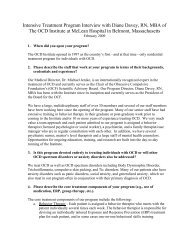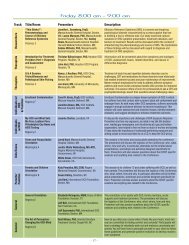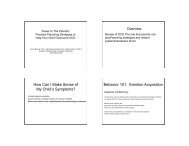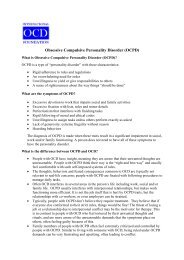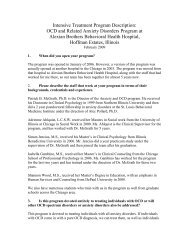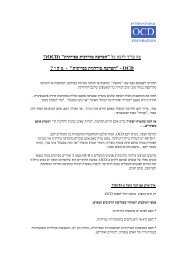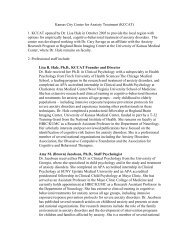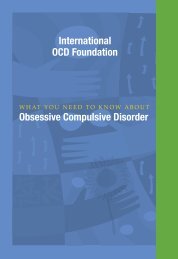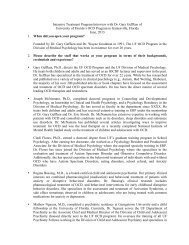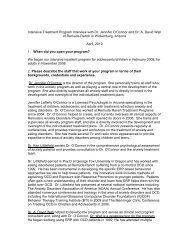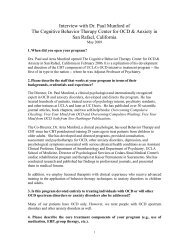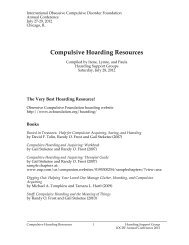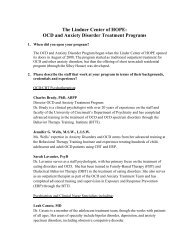Expert Opinion Article on PANDAS - Obsessive Compulsive ...
Expert Opinion Article on PANDAS - Obsessive Compulsive ...
Expert Opinion Article on PANDAS - Obsessive Compulsive ...
Create successful ePaper yourself
Turn your PDF publications into a flip-book with our unique Google optimized e-Paper software.
• In some cases of <strong>PANDAS</strong>, the strep appeared to be “hiding” in the sinuses or<br />
middle ear resulting in a negative throat culture<br />
• It is also possible that n<strong>on</strong>-strep organisms can cause a similar neuropsychiatric<br />
illness in vulnerable children. Therefore, it is important to check for mycoplasma,<br />
m<strong>on</strong>o, or exposure to Lyme disease.<br />
During the meeting at NIH last year, researchers and clinicians across the country began<br />
to revise the criteria defining this illness in children. Based <strong>on</strong> that c<strong>on</strong>ference, because<br />
there are n<strong>on</strong>-strep causes of sudden <strong>on</strong>set illness, researchers changed the name of the<br />
disease to PANS: Pediatric Acute-Onset Neuropsychiatric Syndrome.<br />
Mental and medical professi<strong>on</strong>als should look for:<br />
• Abrupt, dramatic <strong>on</strong>set of OCD is the first diagnostic criteri<strong>on</strong> for PANS. For<br />
those familiar with the CYBOCS (Childhood Yale Brown <strong>Obsessive</strong> <strong>Compulsive</strong><br />
Scale) scores, some clinicians look for an increase in total score of more than 16<br />
in the course of a few days. Children may have mild “quirks” or even some signs<br />
of OCD prior to this abrupt dramatic <strong>on</strong>set. In retrospect some clinicians suggest<br />
that mild micro-episodes may even have occurred in the past. However, in the<br />
space of a few days, they “fall off a cliff”, dramatically causing a significant<br />
decrease in the child’s ability to functi<strong>on</strong>. Impairment is significant. Parents can<br />
usually name the day that the crisis occurred and have vivid memories of the first<br />
obsessi<strong>on</strong>s or compulsi<strong>on</strong>s because of their extreme nature. As an example, a<br />
normally joyful, balanced emoti<strong>on</strong>ally, independent, social child may turn into a<br />
child that has extreme temper tantrums that are out of character, and can no<br />
l<strong>on</strong>ger leave a parent’s side without accommodati<strong>on</strong>. Panic attacks and unusual<br />
anxieties are not uncomm<strong>on</strong>. In additi<strong>on</strong> to the typical obsessi<strong>on</strong>al fears and<br />
compulsive behaviors, this criteri<strong>on</strong> also may be satisfied by the sudden severe<br />
<strong>on</strong>set of food avoidance, anorexia and eating restricti<strong>on</strong>s. Clinically, these occur<br />
as solitary symptoms am<strong>on</strong>g PANS patients, as well as from complicati<strong>on</strong>s<br />
resulting from obsessi<strong>on</strong>al fears of choking, vomiting or of c<strong>on</strong>taminated foods.<br />
• Although there appears to be uniformity in the acuity and severity of <strong>on</strong>set of the<br />
co-occurring symptoms, there is great variability in the nature of the symptoms<br />
accompanying the OCD. As a result, the sec<strong>on</strong>d major criteri<strong>on</strong> for PANS is the<br />
c<strong>on</strong>current acute <strong>on</strong>set of additi<strong>on</strong>al symptoms from at least two of the following<br />
seven categories:<br />
1. anxiety (particularly acute separati<strong>on</strong> anxiety and irrati<strong>on</strong>al fears)<br />
2. emoti<strong>on</strong>al lability and/or depressi<strong>on</strong><br />
3. irritability, aggressi<strong>on</strong> and/or oppositi<strong>on</strong>al behaviors<br />
4. behavioral (developmental) regressi<strong>on</strong><br />
5. sudden deteriorati<strong>on</strong> in school performance<br />
6. sensory or motor abnormalities (particularly dysgraphia/ trouble with<br />
handwriting)<br />
7. somatic/physical signs and symptoms<br />
Internati<strong>on</strong>al OCD Foundati<strong>on</strong> - PO Box 961029, Bost<strong>on</strong>, MA 02196<br />
www.ocfoundati<strong>on</strong>.org | Ph<strong>on</strong>e: 617-973-5801 | Fax: 617-973-5803


